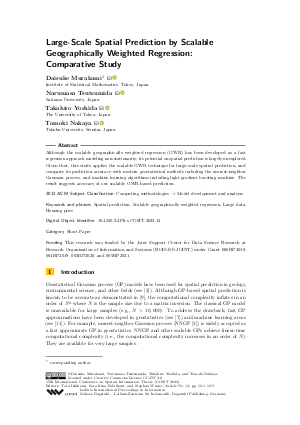Large-Scale Spatial Prediction by Scalable Geographically Weighted Regression: Comparative Study (Short Paper)
Authors
Daisuke Murakami  ,
Narumasa Tsutsumida
,
Narumasa Tsutsumida  ,
Takahiro Yoshida
,
Takahiro Yoshida  ,
Tomoki Nakaya
,
Tomoki Nakaya 
-
Part of:
Volume:
15th International Conference on Spatial Information Theory (COSIT 2022)
Part of: Series: Leibniz International Proceedings in Informatics (LIPIcs)
Part of: Conference: Conference on Spatial Information Theory (COSIT) - License:
 Creative Commons Attribution 4.0 International license
Creative Commons Attribution 4.0 International license
- Publication Date: 2022-08-22
File

PDF
LIPIcs.COSIT.2022.12.pdf
- Filesize: 3.54 MB
- 5 pages
Document Identifiers
Subject Classification
ACM Subject Classification
- Computing methodologies → Model development and analysis
Keywords
- Spatial prediction
- Scalable geographically weighted regression
- Large data
- Housing price
Metrics
- Access Statistics
-
Total Accesses (updated on a weekly basis)
0PDF Downloads0Metadata Views
Abstract
Although the scalable geographically weighted regression (GWR) has been developed as a fast regression approach modeling non-stationarity, its potential on spatial prediction is largely unexplored. Given that, this study applies the scalable GWR technique for large-scale spatial prediction, and compares its prediction accuracy with modern geostatistical methods including the nearest-neighbor Gaussian process, and machine learning algorithms including light gradient boosting machine. The result suggests accuracy of our scalable GWR-based prediction.
Cite As Get BibTex
Daisuke Murakami, Narumasa Tsutsumida, Takahiro Yoshida, and Tomoki Nakaya. Large-Scale Spatial Prediction by Scalable Geographically Weighted Regression: Comparative Study (Short Paper). In 15th International Conference on Spatial Information Theory (COSIT 2022). Leibniz International Proceedings in Informatics (LIPIcs), Volume 240, pp. 12:1-12:5, Schloss Dagstuhl – Leibniz-Zentrum für Informatik (2022)
https://doi.org/10.4230/LIPIcs.COSIT.2022.12
BibTex
@InProceedings{murakami_et_al:LIPIcs.COSIT.2022.12,
author = {Murakami, Daisuke and Tsutsumida, Narumasa and Yoshida, Takahiro and Nakaya, Tomoki},
title = {{Large-Scale Spatial Prediction by Scalable Geographically Weighted Regression: Comparative Study}},
booktitle = {15th International Conference on Spatial Information Theory (COSIT 2022)},
pages = {12:1--12:5},
series = {Leibniz International Proceedings in Informatics (LIPIcs)},
ISBN = {978-3-95977-257-0},
ISSN = {1868-8969},
year = {2022},
volume = {240},
editor = {Ishikawa, Toru and Fabrikant, Sara Irina and Winter, Stephan},
publisher = {Schloss Dagstuhl -- Leibniz-Zentrum f{\"u}r Informatik},
address = {Dagstuhl, Germany},
URL = {https://drops.dagstuhl.de/entities/document/10.4230/LIPIcs.COSIT.2022.12},
URN = {urn:nbn:de:0030-drops-168971},
doi = {10.4230/LIPIcs.COSIT.2022.12},
annote = {Keywords: Spatial prediction, Scalable geographically weighted regression, Large data, Housing price}
}
Author Details
Funding
This research was funded by the Joint Support Center for Data Science Research at Research Organization of Information and Systems (ROIS-DS-JOINT) under Grant 006RP2018, 004RP2019, 003RP2020, and 005RP2021.
References
-
Chris Brunsdon, A Stewart Fotheringham, and Martin Charlton. Some notes on parametric significance tests for geographically weighted regression. Journal of regional science, 39(3):497-524, 1999.

-
Noel Cressie. Statistics for spatial data. John Wiley & Sons, 2015.

-
Abhirup Datta, Sudipto Banerjee, Andrew O Finley, and Alan E Gelfand. Hierarchical nearest-neighbor gaussian process models for large geostatistical datasets. Journal of the American Statistical Association, 111(514):800-812, 2016.

-
A Stewart Fotheringham, Chris Brunsdon, and Martin Charlton. Geographically weighted regression: the analysis of spatially varying relationships. John Wiley & Sons, 2003.

-
Melanie S Hammer, Aaron van Donkelaar, Chi Li, Alexei Lyapustin, Andrew M Sayer, N Christina Hsu, Robert C Levy, Michael J Garay, Olga V Kalashnikova, Ralph A Kahn, et al. Global estimates and long-term trends of fine particulate matter concentrations (1998-2018). Environmental Science & Technology, 54(13):7879-7890, 2020.

-
Paul Harris, AS Fotheringham, R Crespo, and Martin Charlton. The use of geographically weighted regression for spatial prediction: an evaluation of models using simulated data sets. Mathematical Geosciences, 42(6):657-680, 2010.

- Matthew J Heaton, Abhirup Datta, Andrew Finley, Reinhard Furrer, Rajarshi Guhaniyogi, Florian Gerber, Robert B Gramacy, Dorit Hammerling, Matthias Katzfuss, Finn Lindgren, et al. Methods for analyzing large spatial data: A review and comparison. arXiv preprint, 22, 2017. URL: http://arxiv.org/abs/1710.05013.
-
Guolin Ke, Qi Meng, Thomas Finley, Taifeng Wang, Wei Chen, Weidong Ma, Qiwei Ye, and Tie-Yan Liu. Lightgbm: A highly efficient gradient boosting decision tree. Advances in neural information processing systems, 30, 2017.

-
Jin Li and Andrew D Heap. A review of comparative studies of spatial interpolation methods in environmental sciences: Performance and impact factors. Ecological Informatics, 6(3-4):228-241, 2011.

-
Ziqi Li, A Stewart Fotheringham, Wenwen Li, and Taylor Oshan. Fast geographically weighted regression (fastgwr): a scalable algorithm to investigate spatial process heterogeneity in millions of observations. International Journal of Geographical Information Science, 33(1):155-175, 2019.

-
Haitao Liu, Yew-Soon Ong, Xiaobo Shen, and Jianfei Cai. When gaussian process meets big data: A review of scalable gps. IEEE transactions on neural networks and learning systems, 31(11):4405-4423, 2020.

-
Daisuke Murakami, Narumasa Tsutsumida, Takahiro Yoshida, Tomoki Nakaya, and Binbin Lu. Scalable gwr: A linear-time algorithm for large-scale geographically weighted regression with polynomial kernels. Annals of the American Association of Geographers, 111(2):459-480, 2020.

-
Tomoki Nakaya, Alexander S Fotheringham, Chris Brunsdon, and Martin Charlton. Geographically weighted poisson regression for disease association mapping. Statistics in medicine, 24(17):2695-2717, 2005.

